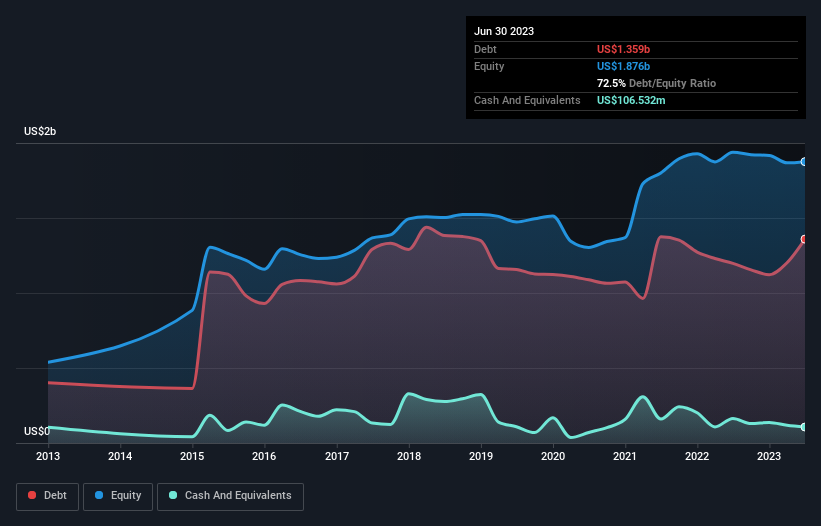- United States
- /
- Marine and Shipping
- /
- NasdaqGS:GOGL
Golden Ocean Group (NASDAQ:GOGL) Takes On Some Risk With Its Use Of Debt
Warren Buffett famously said, 'Volatility is far from synonymous with risk.' It's only natural to consider a company's balance sheet when you examine how risky it is, since debt is often involved when a business collapses. As with many other companies Golden Ocean Group Limited (NASDAQ:GOGL) makes use of debt. But is this debt a concern to shareholders?
Why Does Debt Bring Risk?
Debt and other liabilities become risky for a business when it cannot easily fulfill those obligations, either with free cash flow or by raising capital at an attractive price. Part and parcel of capitalism is the process of 'creative destruction' where failed businesses are mercilessly liquidated by their bankers. However, a more usual (but still expensive) situation is where a company must dilute shareholders at a cheap share price simply to get debt under control. By replacing dilution, though, debt can be an extremely good tool for businesses that need capital to invest in growth at high rates of return. The first step when considering a company's debt levels is to consider its cash and debt together.
See our latest analysis for Golden Ocean Group
What Is Golden Ocean Group's Net Debt?
The image below, which you can click on for greater detail, shows that at June 2023 Golden Ocean Group had debt of US$1.36b, up from US$1.20b in one year. However, because it has a cash reserve of US$106.5m, its net debt is less, at about US$1.25b.

How Strong Is Golden Ocean Group's Balance Sheet?
The latest balance sheet data shows that Golden Ocean Group had liabilities of US$243.3m due within a year, and liabilities of US$1.35b falling due after that. Offsetting these obligations, it had cash of US$106.5m as well as receivables valued at US$80.6m due within 12 months. So its liabilities total US$1.40b more than the combination of its cash and short-term receivables.
This deficit is considerable relative to its market capitalization of US$1.56b, so it does suggest shareholders should keep an eye on Golden Ocean Group's use of debt. This suggests shareholders would be heavily diluted if the company needed to shore up its balance sheet in a hurry.
We measure a company's debt load relative to its earnings power by looking at its net debt divided by its earnings before interest, tax, depreciation, and amortization (EBITDA) and by calculating how easily its earnings before interest and tax (EBIT) cover its interest expense (interest cover). Thus we consider debt relative to earnings both with and without depreciation and amortization expenses.
Golden Ocean Group has a debt to EBITDA ratio of 3.7 and its EBIT covered its interest expense 4.3 times. This suggests that while the debt levels are significant, we'd stop short of calling them problematic. Worse, Golden Ocean Group's EBIT was down 66% over the last year. If earnings continue to follow that trajectory, paying off that debt load will be harder than convincing us to run a marathon in the rain. The balance sheet is clearly the area to focus on when you are analysing debt. But ultimately the future profitability of the business will decide if Golden Ocean Group can strengthen its balance sheet over time. So if you want to see what the professionals think, you might find this free report on analyst profit forecasts to be interesting.
Finally, a business needs free cash flow to pay off debt; accounting profits just don't cut it. So it's worth checking how much of that EBIT is backed by free cash flow. In the last three years, Golden Ocean Group's free cash flow amounted to 42% of its EBIT, less than we'd expect. That weak cash conversion makes it more difficult to handle indebtedness.
Our View
Mulling over Golden Ocean Group's attempt at (not) growing its EBIT, we're certainly not enthusiastic. But at least its conversion of EBIT to free cash flow is not so bad. Overall, it seems to us that Golden Ocean Group's balance sheet is really quite a risk to the business. For this reason we're pretty cautious about the stock, and we think shareholders should keep a close eye on its liquidity. When analysing debt levels, the balance sheet is the obvious place to start. But ultimately, every company can contain risks that exist outside of the balance sheet. Case in point: We've spotted 3 warning signs for Golden Ocean Group you should be aware of.
If, after all that, you're more interested in a fast growing company with a rock-solid balance sheet, then check out our list of net cash growth stocks without delay.
New: Manage All Your Stock Portfolios in One Place
We've created the ultimate portfolio companion for stock investors, and it's free.
• Connect an unlimited number of Portfolios and see your total in one currency
• Be alerted to new Warning Signs or Risks via email or mobile
• Track the Fair Value of your stocks
Have feedback on this article? Concerned about the content? Get in touch with us directly. Alternatively, email editorial-team (at) simplywallst.com.
This article by Simply Wall St is general in nature. We provide commentary based on historical data and analyst forecasts only using an unbiased methodology and our articles are not intended to be financial advice. It does not constitute a recommendation to buy or sell any stock, and does not take account of your objectives, or your financial situation. We aim to bring you long-term focused analysis driven by fundamental data. Note that our analysis may not factor in the latest price-sensitive company announcements or qualitative material. Simply Wall St has no position in any stocks mentioned.
About NasdaqGS:GOGL
Golden Ocean Group
A shipping company, owns and operates a fleet of dry bulk vessels worldwide.
Slight risk and fair value.
Similar Companies
Market Insights
Community Narratives





